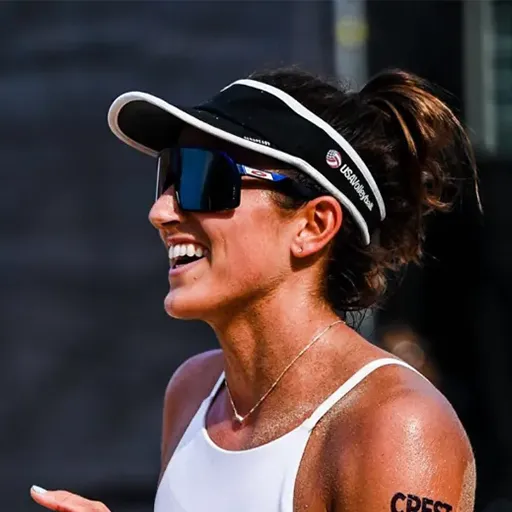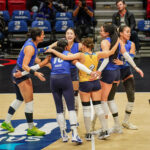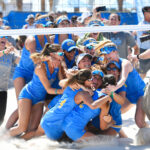AAU Beach Volleyball To D1 Scholarship
Beach volleyball is the fastest growing NCAA sport after making its first debut in Spring 2016. Since then, more than 90 Universities across the country have added a collegiate beach volleyball program with more planning to add a team soon.
It’s amazing how fast this sport has grown. For many volleyball players, beach volleyball was put on the back burner when looking for a college. I also grew up in Arizona; there’s no beach. I played indoor year round and occasionally squeezed some tournaments in the dirt baseball fields on the outskirts of Phoenix. If I got lucky, I would drive to California to compete against the local big dogs. Now that beach volleyball is an NCAA sport, it’s off the back burner, folks! It’s been in the shadow of indoor volleyball forever, but now it’s shining bright.

With over 90 colleges with beach volleyball programs and counting across the country, it’s no surprise that we’ve seen an even bigger jump in the number of clubs popping up around the country. As of 2020, there are over 400 beach clubs across the U.S. When I graduated high school in 2014 in Arizona, there were no beach clubs. Now, we have 10 in the valley, with RPM Sand being the first. I’ve loved seeing it grow to the #2 beach club in the country. Who knew Arizonans could play beach?!
Because of all this, it’s so important for girls, coaches, and parents who have or support this dream to know the steps towards turning these dreams into a D1 Scholarship. I’m lucky to be great friends with the people that have turned RPM Sand into one of the most dominate beach clubs in the country. Recently, I chatted with with Ryan Mariano and Nick Bowling (the owner and founders) to break down the sport – we covered the rapid growth of the game, what the beach volleyball recruiting process looks like, what college coaches look for in a player, how beach volleyball bridges the gap for youth players and so much more. Any and everything that may be beneficial to athletes and parents that are jumping on the beach volleyball train, we covered it.
Why Has Beach Volleyball Grown So Quickly In The Past Five Years?
RPM: About seven years ago, the AVP and Al Lau were working with the NCAA – Pepperdine, USC, and UCLA got in first. Right about then, we started having the volleyball clubs pop up and had success. NCAA said, ”Hey – let’s give it a run.” It went from ten schools to 25. Once that happened, just naturally the clubs started to evolve. It has been a neat roller coaster to watch. It has given people an opportunity to say – “Indoor just wasn’t for me. Now I have a place to go.” An we all know once you get on the beach… it’s over. You never go back!
How Do Teams Qualify For AAU Volleyball Nationals?
RPM: Find the tournaments that kids can qualify for AAU Volleyball Nationals. A lot of big National Championships have tournaments along the way that you must earn bids to. Also, figure out what’s available to you – how to fit [tournaments] in and maximize my time, have dead days in-between tournaments, how to be efficient.
Do You Encourage Your Athletes To Go From Tournament To Tournament Everyday? Or Do You Encourage Your Athletes To Take Periodic Rest Days? How Should Parents Handle A Busy Volleyball Season?
RPM: We push tournaments responsibly. We don’t want them to jump into the AVP First and be just gassed when you know all the college coaches are going to be at that event. College coaches are at that event because it overlaps with the AVP – they can recruit and see the pros play. So being responsible is important and factoring in rest. And being comfortable choosing tournaments and resting in between, not feeling like you have to grind the whole summer. We realized as a club, and for our girls, we were having more success when we were tapering and taking little breaks here and there throughout the season.
What Tournaments Are College Coaches Attending For Recruiting? Cbva, Aau, Bvca, Usa, P1440…
RPM: There are about three major events that typically college coaches will go to – BVCA is the biggest club vs. club where you get your top club titles. The AVP First obviously just works. It’s all encompassing – college coaches get to watch their pro friends and they get to watch and recruit the juniors. And I think you gotta do your research for that third major tournament; do your research and see where the tournament falls, and which ones you can attend. It’s important to attend the tournaments that not only college coaches are attending, but also ones that are going to be giving you the best competition.
Do a little bit of leg work first. If a kid wanted to go play at Stanford, UCLA or wherever I would reach out to those Universities and ask “Where are you going to be?” or “I’m a junior I’m interested in your school – this is my schedule.” And hopefully they will get back to you and say, “Hopefully I can see you play at the AAU and the P1440.” When you get responses like those back from college coaches, you now will know a month in advance which tournaments you should prioritize over other tournaments.
“SIDE NOTE FROM ME: PICK YOUR TOURNAMENTS EARLY ENOUGH TO GET IN CONTACT WITH THESE COLLEGE COACHES AND REACH OUT, AND BE PROACTIVE.“
It’s basically becoming an indoor recruiting process. If you want college coaches to look at you, you don’t want to be obnoxious, but at the same time you are promoting yourself. Coaches are doing 10,000 things at once and other girls are reaching out just like you. So be persistent, communicate until the coaches respond. If they say, “No,” at least you know and you can move on to a different school. You will narrow your search and you will eventually get yesses! It’s an important part of the process – be persistent and communicate!
It’s good to note that club coaches are interacting with college coaches too. Not only are the girls responsible for getting their name and their video out there talking to the coaches of these universities, but it’s also important for other coaches to know that it’s there job to a certain degree to develop contacts communicate with coaches as well asking questions like, “What are you looking for, a defender a blocker,? What style of player?”
Ryan, Nick and RPM Sand has been able to get 56 girls to the collegiate beach level by pushing their players to be proactive and communicate with college coaches as much as the rules allow as well as holding themselves accountable to create relationships and contacts with college coaches as well.
What Does A Typical Beach Club Season Look Like? Are All These Tournaments Within A Two Months Window?
RPM: It’s a three week sprint starting around the 6th of July. And then we are back to Phoenix on the 1st of August. It’s just about every day with an occasional day off in-between.
How Does Beach Volleyball Connect The Youth To The Pros?
RPM: Wilson Volleyball and the AVP do a great job giving opportunities to the youth players and spectators to talk to you and the Caseys and Stafford and such. Wilson becomes this synonymous name with the sport. It’s nice for the kids to realize they are supported by a great company!
It’s really cool for kids to play their tournament, sometimes even play on center court and see what that feels like. Just for them to get a little insight on what it’s like to be there just pushes them and their dreams that much more! I think it’s cool how the AVP has AVP First tournaments on the side. It connects the pros with players, whether that’s getting autographs or getting to talk to them after we play. It creates a level of reliability, too. We are just like them. We were just like them. And it just takes hard work, practice and going to all these tournaments to get to that level.
What separates title sponsors like Wilson is they are a universal ball. They don’t have to be involved. They are the best brand that you can have for the sport – for a lot of sports. For them to step up and be so proactive in beach volleyball, to have the network of athletes like you guys and the team Wilson – it’s huge! It’s grown the AVP. It’s grown the game exponentially!
How Does The College Volleyball Recruiting Process Work? What Are The Coaches Looking For?
RPM: Academics are #1. With our program, we stay up on the kids’ grades. We don’t have a GPA minimum, but we do have the conversations. If you are interested in these schools, your GPA needs to be a 3.5 or better. And I don’t think people understand the importance of that.
Another thing for coaches to learn is get an understanding of what the college coaches want. And being realistic in the process – getting a good understanding and baseline of what each kid can do.
“Side note from me: It’s important for kids to learn how to be good teammates. Beach volleyball in college, and now club, is not a two person sport. Kids are playing for something bigger than themselves. They are now part of a club which they are now repping on their backs at all these tournaments. I would hope college coaches are not only looking for athletic ability in kids, but character. How well they treat their partner in good and bad situations, looking at things like “Are they cheering on their teammates playing or sitting on their phones under the tent.” Little gestures like that speak volumes. And to win National Championships and reach the collegiate level, teamwork and character go a long way. “
What Advice Would You Give Club Volleyball Coaches And Players During The Quarantine?!
RPM: When we first entered the quarantine, we had no idea how long we would be in this. We’ve gone from trying millions of challenges and tons of workouts to encouraging our players to reach out and see what other players are doing across the country. We encourage them to connect with other players because who knows you might connect and have a partner down the road!
Another big thing to keep us connected are Zoom calls! And trying our best to get professional beach volleyball players on to ask any questions the girls might have!
I HOPE I WAS ABLE TO ANSWER SOME OF THE QUESTIONS YOU MAY HAVE! UNTIL NEXT TIME – STAY SAFE AND BE WELL. – SS

Sarah Sponcil is a prominent figure in the world of professional volleyball, known for her exceptional skills, work ethic and achievements on the court. Born on August 16, 1996, in Phoenix, Arizona, Sponcil began her volleyball journey at the age of three and has been showcasing her immense talent and dedication to the sport ever since.
Garnering three high school state championships in Arizona, and two NCAA national championships at UCLA, Sponcil’s career reached new heights when she represented the United States at the 2020 Olympic Games. At 24 years of age, Sponcil became the second youngest beach volleyball player to ever represent Team USA in the Olympic Games and, together with her partner Kelly Claes, were the youngest beach volleyball team to ever represent Team USA in the Olympic Games.
Following her Olympic success, Sponcil has continued to excel as a professional volleyball athlete, earning numerous accolades and recognition for her prowess as both an indoor and beach volleyball player. Her versatility, athleticism, and relentless determination has solidified her reputation as one of the top players in the sport and make her a force to be reckoned with on any volleyball court.
Off the court, Sponcil is known for her humility, work ethic, and commitment to her faith, family, and desire to inspire the next generation of athletes. She serves as a role model for aspiring volleyball players worldwide, demonstrating that with passion, perseverance and dedication, anything is possible in the world of sports.
Search Posts
Categories
Latest Releases
Beyond Skill: What does leadership mean to you?
Championship Team: Lessons from Faith & Sports
I’ll Be Home For Christmas
Search Posts
Categories
Latest Releases



